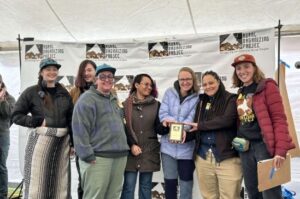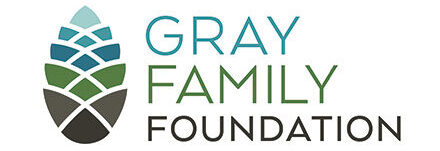Bridging Divides: How the Rural Organizing Project Empowers Oregon’s Communities
For groups in Oregon that are working to effectively organize for issues facing rural communities, such as migrant justice, worker’s rights, or keeping rural post office locations open, the Rural Organizing Project has been a key partner, fulfilling many roles.
“We see ourselves as the connector, incubator, breaker of isolation, creator and sharer of resources, storytellers, amplifiers, helping to raise the profile of the work that’s going on in Oregon, nationally, and telling the story about why Oregon matters, why rural matters,” says Sam Corti, ROP’S Development and Communications Coordinator.
The organization was founded in 1992 as a result of people in rural Oregon wanting to organize against a ballot initiative that would legalize second-class citizenship for the LGBTQ community.
“They were told to go to Portland,” says Corti. In response, ROP launched to ensure that issues facing rural Oregonians could be dealt with in rural Oregon.
“In doing that work, we also connected and realized that a lot of the same struggles that our LGBTQ friends were facing were a lot of the same issues that immigrants and BIPOC folks were facing,” says Corti. “There’s so much intersectionality in all these issues, 30 years later we are really recognizing that but ROP was on the forefront of connecting those dots.”
ROP provides resources, skills, space, and leadership development for 84 Human Dignity Groups, defined by ROP as groups who are organized with the belief in equal worth of all communities, the need for equal access to justice, and the right to self determination. ROP helps activists build groups from the ground up and equips them for long haul, sustainable grassroots organizing. ROP advises groups through shifts in leadership and creates and provides a capacity building toolkit to help groups organize effectively. ROP provides guidance on election-specific messaging and guides groups to create communications that combat misinformation and break down complex issues. ROP partners with groups in 34 counties, from the coast to the high desert, and provides specific support to each group.
“ROP has a unique model,” says Corti. “The reason our impact is so vast is because of the autonomous human dignity groups. We get our priorities directly from these groups.”
Those priorities include economic security, clean water access, rural infrastructure, reproductive health, migrant justice, and workers rights. Member groups have successfully campaigned for rental assistance and expanding automatic voter registration. ROP hosts the Rural Caucus and Strategy Session, where over 100 leaders convene to discuss a long list of topics, including disaster preparedness, community media, and how to respond to hate crimes and white supremacy in their towns.
In Hood River, a partnership between ROP and the Hood River Latino Network led to the opening of the Hood River Latino Network Immigrant Help Center in June of this year. The Center will serve as a space to host events and training for leadership, and youth development. Many groups are intergenerational and ROP has hosted a Youth Fellowship Program which invites group members 16 – 30 years old to gather and empower one another to organize for democracy in their towns.
The Gray Family Foundation awarded ROP a grant to support its work uniting rural voices in a mission to improve the quality of life for Oregonians all over the state, for its youth-empowering work, and for amplifying climate issues rural Oregonians face.
One of those occurred in Douglas County, where a community rights group was calling for the removal of the Winchester Dam on the North Umpqua River. An Oregon Water Resources Department inspection revealed safety issues, and the dam was interrupting the migration of endangered fish.
ROP organizers provided skills and know-how to the group beginning with how to build a campaign using strategic communications and values-forward messaging. The campaign included the history of the dam and how the local ecosystems and populations were impacted. The dam removal was linked to broader issues of clean water access and wildlife by highlighting similar campaigns, such as the work of the Confederated Tribes of the Umatilla Indian Reservation to remove the Snake River Dam. This helped elevate the issue statewide. The group developed a Call to Action and people in the area shared their stories. The group pressured the local government to remove the dam and helped to galvanize public support for removal. In April 2024, the removal of the Winchester Dam became a priority of the Oregon Department of Fish and Wildlife.
While the ROP is rural-focused, part of its mission is to shift the narrative away from the rural urban divide so prevalent in politics and illuminate how rural populations have the same needs but are often disproportionately impacted by a dearth of resources, like clean water or swift access to 911 services in a disaster. The ROP’s vision is that solutions can be reached by looking at the issues through a rural lens, and making sure that organizing happens in rural areas, for and by rural people, while being amplified statewide.
“There are ideas that to get something done, you have to go to Portland or Salem or a city center,” says Corti. “The work is happening in rural areas, and often that’s where you can shift the narrative. If you can have really productive conversations and meet with shared values, then it’s not such a contentious battle of left versus right. That’s what ROP stands behind, to have conversations with neighbors to move things forward together.”

